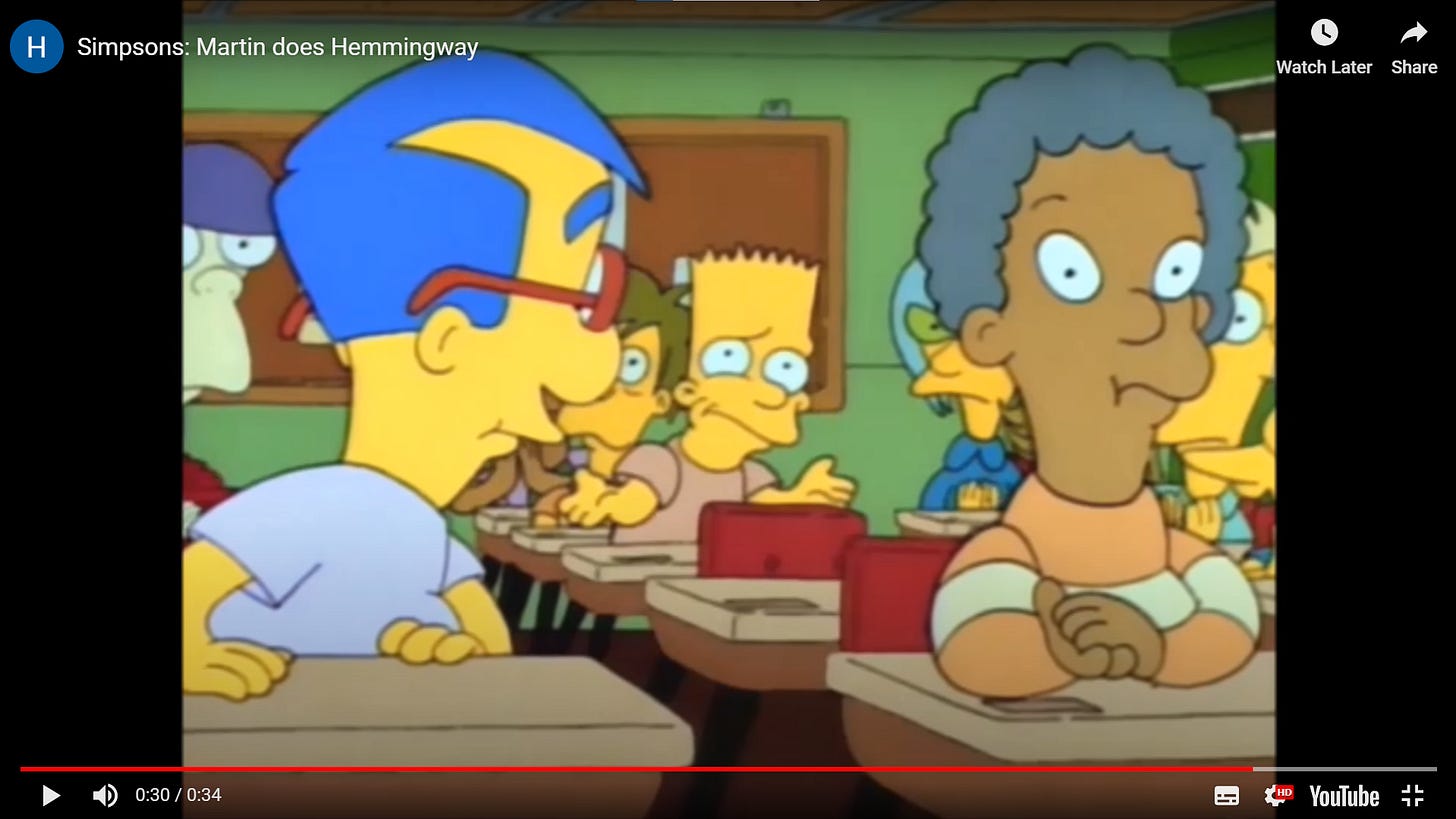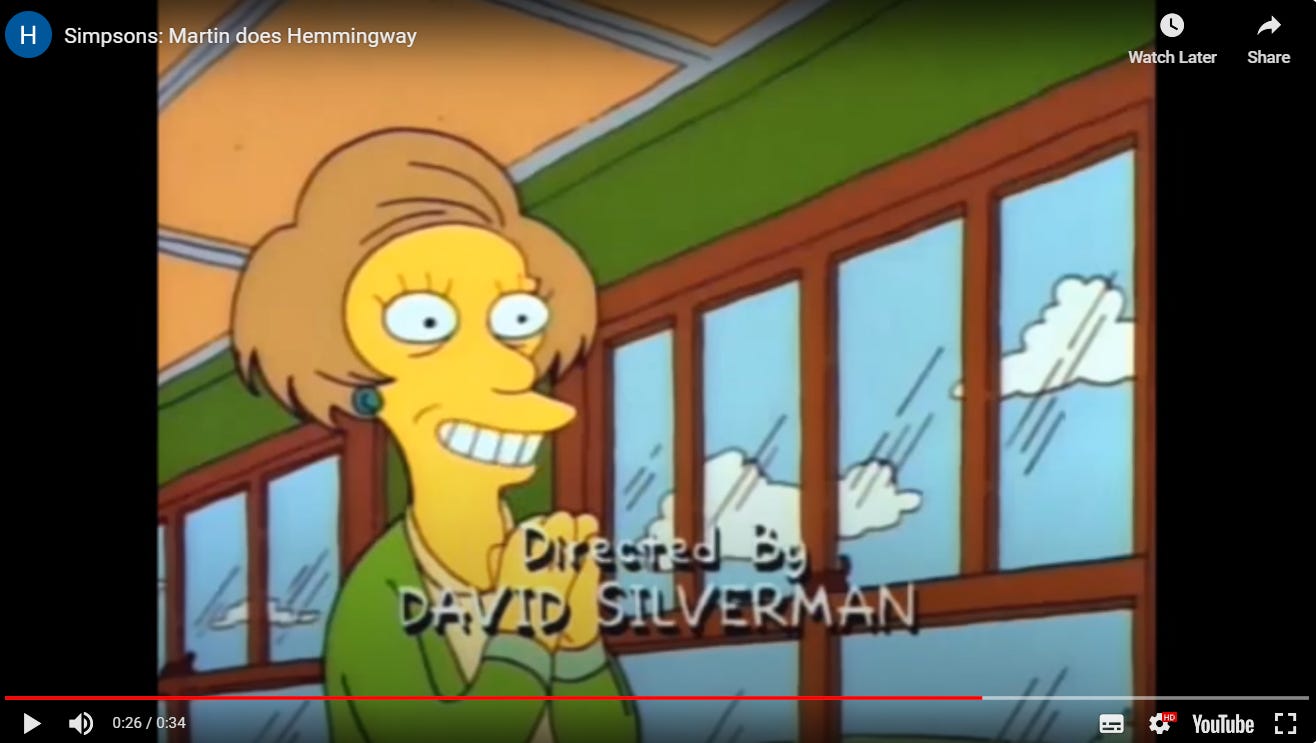"Bart Gets an F": A Satirical Tale of Assessment Woes at Springfield Elementary School
What assessment looks like when we get it wrong...
Synopsis
Bart Simpson’s grades are falling and he may have to repeat fourth grade if he fails another test.
If you are not familiar with this episode, you can watch it with a Disney+ subscription at this page here or you can watch excerpts of the episode on YouTube here or you can read the transcript at a Simpsons Wiki here.
The episode opens with the class whizkid, Martin Prince presenting his book report on Ernest Hemingway’s “The Old Man and the Sea”. As Martin performs, the scene cuts away to the confused expression of the entire class who seemingly have no understanding of what Martin is on about.
As he finishes his presentation, the teacher, Mrs. Krabappel is elated. She furiously claps her hands, rolls her head back in delight and says “Oh, absolutely brilliant!…There were moments I truly believed you were Hemingway”.
The scene again cuts away to a confused looking class, seemingly unaware of how or why the presentation was “brilliant”. Martin is clearly a gifted student and the audience learns that he is most likely an outlier in this class.
After Martin’s presentation, Bart is called upon to deliver his own book report on “Treasure Island” and it is clear once his presentation concludes that he was not prepared. When pressed by Mrs. Krabappel on whether he had read the book, Bart is unable to name the pirate in the book and is told to stay back after class as a consequence. Bart is admonished in his meeting with Mrs. Krabappel as he writes “lines” on the chalkboard and is told “Your grades have gotten steadily worse…are you aware that there is a major exam tomorrow?”.
In the next scene, the Simpson family is eating dinner around the table and the mother (Marge) asks Lisa (Bart’s high achieving sister) to share her good news. “I got an A on my vocabulary test” Lisa says and Homer celebrates triumphantly, raising his hands in the air saying “Oh, what a glorious day!” He takes Lisa’s test and sticky-tapes it to the fridge which is covered by what appear to be numerous other high test scores from Lisa. Notably, Homer chooses to place it over Bart’s only achievement on the fridge: a year 1 drawing of a cat. As the night closes, Bart struggles to make time to revise for the major exam the next day and he falls asleep with his face in the textbook. He wakes up the next morning, panicked, and asks the school bus driver if he could crash the bus on the way to school because he has a “big test” that he is “not ready for”. The bus makes it safely to Springfield Elementary School without crashing and so Bart feigns illness to avoid completing the test. He returns home and phones his friend Milhouse in an attempt to find out what was on the test. The next day, Bart completes the test and has it marked immediately by Mrs. Krabappel who covers it in red crosses and exclaims “This test is worse than Milhouse’s exam!”.
A meeting ensues with Bart, his parents, Mrs. Krabappel and the school counsellor and they accuse Bart of being an “underachiever” and proud of it. They lament how other students in his class have shown marked signs of improvement, but he has not. To emphasise the point, Mrs. Krabappel recounts the terrible marks Bart has received for many of his recent tests before Bart, who is clearly hurt by the exchange, interjects “I know it. You know it. I am dumb, okay? Dumb as a post!”. The meeting concludes with the recommendation that Bart repeat the fourth grade unless he can pass the final test. Bart is frightened by the idea that he would be held back and pleads with them and promises that he will change and that he will pass the test.
The episode concludes with Bart praying for a miracle the night before the test resulting in unseasonable snow in a North American summer which closes all schools and workplaces. With this extra day of study, Bart tries to focus his distracted mind on learning about the colonial history of America. He completes the test the next day and worryingly asks Mrs. Krabappel to mark it immediately. She agrees and says “Let me get ‘old red'” and proceeds to mark the test, failing Bart. Bart breaks down crying and she responds by saying “I would think you’d be used to failing by now”. He responds “This is as good as I can do and I still failed”. She counters “Well, a 59 – it’s a high F”. Through his tears, Bart laments he feels as bad as how George Washington must have felt when he surrendered Fort Necessity to the French in 1754. In a positive end to the episode, Mrs. Krabappel explains that because Bart “demonstrated applied knowledge” and “due to the difficulty and relative obscurity of the reference”, Bart deserved an extra point on his exam. Bart therefore passes his test “barely” and is not required to repeat the fourth grade.
Analysis
There was no evidence in the episode that the teacher ever explained the learning intentions or success criteria for the book report task.
There was no evidence in the episode that the students, except for the one outlier (Martin), understood how to write a book report let alone successfully present one. Evidently, Mrs. Krabappel had not discussed a rubric or marking criteria with any of the students prior to having them deliver the presentation.
There was evidently moderate student direction with the book report task in that students could select their own book of choice, however, the task was apparently not differentiated. The expectation that Bart Simpson, as a year 4 student of significantly lower ability, could read a 52000+ word novel that included lots of jargon and nautical themes, and present a book report on it in front of his peers is unfair.
There is overarching focus on tests, scores, grades and achievement in the episode. This is evident in the scenes in the classroom; when Bart is punished for not meeting his teacher’s expectations for the book report task; in the meeting with the school counsellor; and in the exchanges at the Simpson family dinner table.
Homer and Marge, Bart’s parents, do not assist Bart at home and are dumbfounded why he is not progressing in his learning even though he “tries so hard”.
The impact of the overarching focus on tests, scores, grades and achievement causes several significant, negative emotional responses from Bart: anxiety, stress, sadness, feelings of worthlessness, depression.
Bart equates “failure” as a person with his test scores: he knows he is dumb because of his test scores.
Bart finally passes the fourth grade not because of his test score but because he was given (or took!) an informal opportunity to demonstrate his learning: the only real opportunity he had in the entire episode.
Bart’s intrinsic motivation to learn fails because it is driven by presumed extrinsic rewards over which he seemingly has no control.
Mrs. Krabappel does not provide effective feedback that would enable Bart to improve his learning outcomes, and in fact, is quite scathing with her commentary (“This test is worse than Milhouse’s exam!”).
Mrs. Krabappel has a bizarre marking criteria that allows her to award marks for a question not on the test!
In sum, the broad educational context in which Bart Simpson operates is not conducive to improved learning outcomes.
Key Takeaways
The Simpsons is, of course, a work of fiction, but like all good satire it examines the shortcomings of society and holds them up to ridicule. Avid watchers of the show would be well aware that Springfield Elementary School (a public school) is often portrayed as an underfunded institution with shambolic leadership, and one beset by all manner of problems with student behaviour and low levels of achievement. Viewed in this context, it is unsurprising that Mrs. Krabappel’s classroom is not an exemplar of leading pedagogy: that is precisely the point. The episode is about shining a light on these problems to explain Bart’s “failures” as a student and person.
In sum, Bart had limited prospects for “success” (rigidly defined by test scores and grades) because he was not presented with opportunities to demonstrate what he knew or could do. His teacher did not provide criteria to clarify for students what aspects of learning were being assessed. His teacher provided limited feedback, and that which was provided was not conducive to Bart improving his tasks, processes, self-regulation or self, as it was mostly focused on grades without identifying how learning can be improved.




